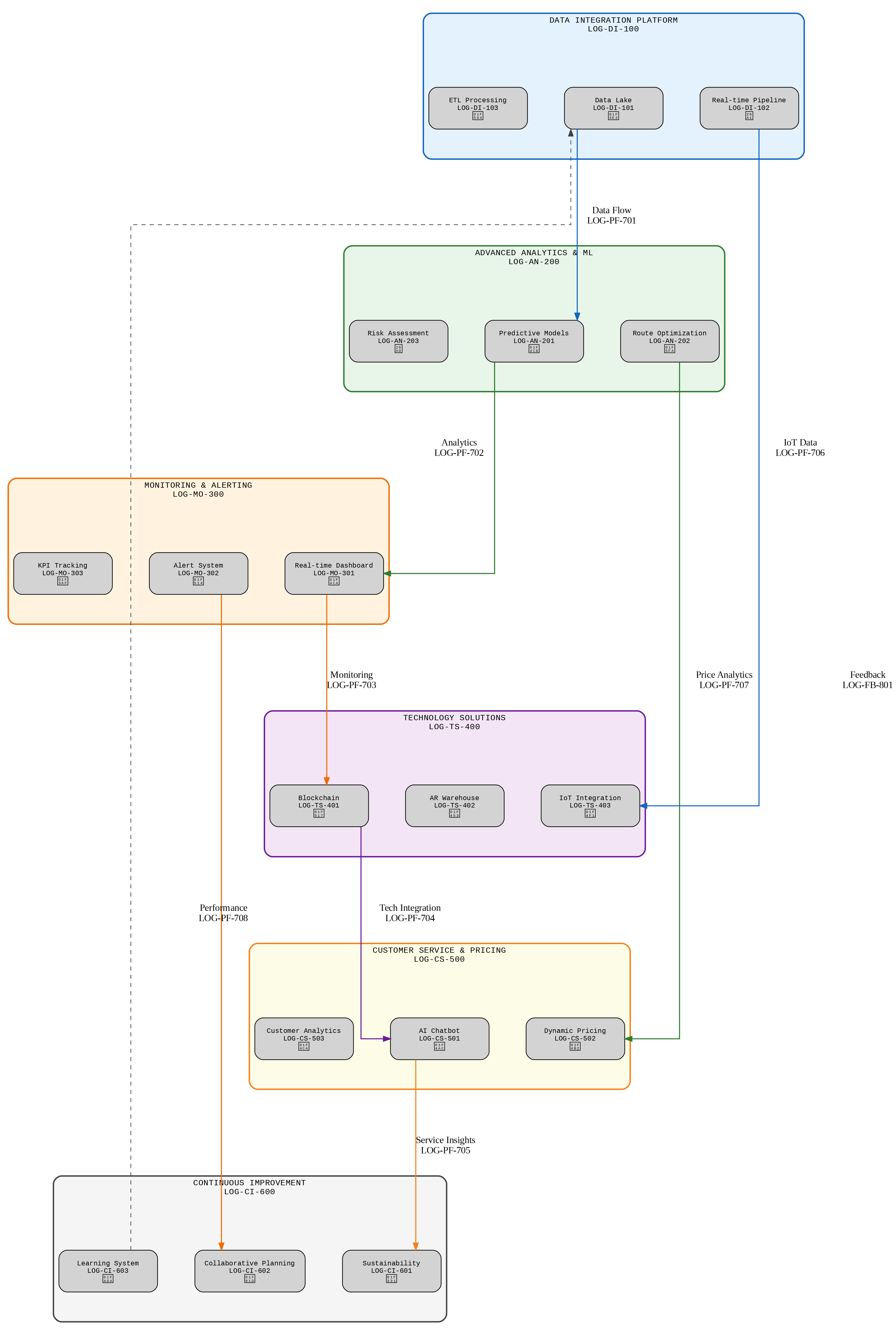Logistics 4.0:
A Blueprint for Next-Generation Logistics Operations
Table Of Contents
Introduction
Comprehensive Data Integration Platform
Advanced Analytics and Machine Learning
Real-time Monitoring and Alerting System
Blockchain-based Supply Chain Traceability
AI-powered Customer Service and Interaction
Augmented Reality (AR) for Warehouse Management
Dynamic Pricing and Revenue Management System
Conclusion
The Enhanced Logistics Operational Insights Solution represents a revolutionary approach to these challenges, offering a comprehensive framework that leverages cutting-edge technologies to transform traditional logistics operations. By integrating advanced data analytics, artificial intelligence, blockchain, and augmented reality, this solution provides transportation companies with a powerful toolkit to optimize operations, enhance decision-making, and drive sustainable growth. Through ten interconnected components, ranging from comprehensive data integration to continuous improvement systems, this solution addresses the full spectrum of modern logistics challenges while establishing a foundation for future innovation and operational excellence.
1. Comprehensive Data Integration Platform
Implementation:
- Develop a centralized data lake using cloud technologies like AWS Lake Formation or Azure Data Lake Storage.
- Implement real-time data ingestion pipelines using Apache Kafka or AWS Kinesis for streaming data from various sources.
- Utilize ETL tools like Apache NiFi or Talend for batch processing of historical data.
Benefits:
- Enables seamless integration of data from diverse sources (IoT devices, ERP systems, customer portals, etc.).
- Provides a single source of truth for all operational data.
- Facilitates real-time and batch processing capabilities.
2. Advanced Analytics and Machine Learning
Implementation:
- Develop predictive models using technologies like TensorFlow or PyTorch for:
- Demand forecasting
- Route optimization
- Predictive maintenance
- Risk assessment
- Implement anomaly detection algorithms to identify potential issues in real-time.
- Utilize natural language processing (NLP) for sentiment analysis of customer feedback.
Benefits:
- Enables proactive decision-making based on data-driven insights.
- Optimizes operational efficiency and reduces costs.
- Enhances risk management and improves customer satisfaction.
3. Real-time Monitoring and Alerting System
Implementation:
- Develop a real-time monitoring dashboard using Grafana or Tableau.
- Implement automated alerting systems using tools like PagerDuty or OpsGenie.
- Create custom KPIs and thresholds for different operational aspects.
Benefits:
- Provides immediate visibility into operational performance.
- Enables quick response to potential issues or bottlenecks.
- Facilitates proactive management of customer expectations.
4. Blockchain-based Supply Chain Traceability
Implementation:
- Implement a private blockchain network using Hyperledger Fabric or Ethereum Enterprise.
- Develop smart contracts for automating and securing key processes.
- Integrate IoT devices with blockchain for real-time tracking and verification.
Benefits:
- Enhances transparency and trust across the supply chain.
- Improves traceability and reduces fraud.
- Streamlines documentation and compliance processes.
5. AI-powered Customer Service and Interaction
Implementation:
- Develop an AI-powered chatbot using platforms like Dialogflow or Rasa.
- Implement voice recognition and natural language understanding capabilities.
- Integrate the AI system with existing CRM and operational databases.
Benefits:
- Provides 24/7 customer support and reduces response times.
- Enhances customer experience through personalized interactions.
- Frees up human resources for more complex tasks.
6. Augmented Reality (AR) for Warehouse Management
Implementation:
- Develop AR applications for smart glasses or mobile devices using ARCore or ARKit.
- Integrate AR systems with warehouse management software and IoT devices.
- Implement computer vision algorithms for object recognition and space optimization.
Benefits:
- Improves picking and packing efficiency.
- Reduces errors in inventory management.
- Enhances worker training and safety.
7. Dynamic Pricing and Revenue Management System
Implementation:
- Develop a machine learning model for dynamic pricing using technologies like scikit-learn or H2O.ai.
- Integrate real-time market data, competitor pricing, and demand forecasts.
- Implement A/B testing capabilities for pricing strategies.
Benefits:
- Optimizes pricing to maximize revenue and profitability.
- Enables quick adaptation to market changes and competitive pressures.
- Improves customer segmentation and targeted offerings.
8. Sustainability and Carbon Footprint Tracking
Implementation:
- Develop a carbon footprint calculation engine using standardized methodologies.
- Implement IoT sensors for real-time emissions monitoring.
- Create dashboards for tracking and reporting sustainability metrics.
Benefits:
- Enables compliance with environmental regulations.
- Supports corporate social responsibility initiatives.
- Provides data-driven insights for reducing environmental impact.
- 9. Collaborative Planning and Forecasting Platform.
Implementation:
- Develop a cloud-based collaborative platform using technologies like Kubernetes and microservices architecture.
- Implement advanced forecasting models using ensemble methods and deep learning.
- Create intuitive interfaces for stakeholder input and scenario planning.
Benefits:
- Improves forecast accuracy through multi-stakeholder collaboration.
- Enhances supply chain resilience through better planning.
- Facilitates better alignment between different parts of the organization.
- 10. Continuous Improvement and Learning System.
Implementation:
- Develop a knowledge management system using technologies like Elasticsearch.
- Implement a machine learning-based recommendation engine for best practices.
- Create gamification elements to encourage knowledge sharing and learning.
Benefits:
- Facilitates organizational learning and knowledge retention.
- Improves operational efficiency through the spread of best practices.
- Enhances employee engagement and skill development.
In conclusion, this comprehensive logistics operational insights solution represents a transformative approach to modern transportation and supply chain management. By leveraging cutting-edge technologies across ten key areas—from data integration and advanced analytics to blockchain traceability and augmented reality—the solution provides transportation companies with the tools needed to thrive in an increasingly complex global marketplace. The integrated implementation of these components delivers measurable benefits including enhanced operational efficiency, improved customer satisfaction, reduced costs, and strengthened sustainability practices. Furthermore, the solution’s emphasis on continuous improvement and collaborative planning ensures long-term adaptability and scalability. As the transportation industry continues to evolve, organizations that adopt this holistic approach to operational insights will be well-positioned to maintain competitive advantages, drive innovation, and deliver superior value to their stakeholders. This comprehensive solution not only addresses current industry challenges but also provides a future-proof foundation for ongoing digital transformation in global transportation operations.

Meet Our Lead Instructors
Lorem ipsum dolor sit amet, consectetur adipiscing elit. Duis ac eros ut dui bibendum ultricies. Maecenas egestas fringilla semper.




Number Speaks
10+
Awards
5+
Countries
12+
Partners
7K+
Students
What Our Students Have to Say




